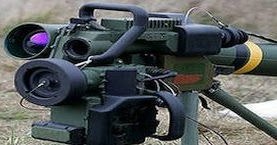INDIA STOCKS UP MISSILE ARSENAL AS IT PREPARES FOR ANOTHER TENSE SUMMER IN LADAKH
New Delhi: India is in the process of stocking up its missile arsenal as the stand-off with China in eastern Ladakh continues for the eighth consecutive month and the services extensively plan for the challenges that may emerge in the summer.
According to a report published in Jane’s Defence Weekly, a noted publication on military matters, India has awarded a $200 million contract to Israel’s Rafael Advanced Defence Systems for supplying an undisclosed number of SPICE bomb-guidance kits, and between 300 and 320 Spike-Long Range Anti-Tank Guided Missiles (ATGMs), besides the BNET broadband IP software defined radios, which are pitched as a system for secure communications during on-the-move tactical operations.
The equipment, the report dated 24 December states, will be delivered by early 2021. It has been procured under the emergency powers given to the armed forces by the Union defence ministry this July to procure weapons systems worth up to Rs 300 crore on an urgent basis.
A senior IAF officer said the fresh purchase of the SPICE-2000 air-to-ground missiles is an emergency procurement.
This weapon has already been integrated into the Mirage-2000 fleet and the Sukhoi-30 fighters of the IAF. The SPICE-2000 bombs, which weigh 500 kg, can also be integrated onto Jaguars and the indigenous Tejas as well, the officer added.
“The Spice 2000 bombs have proven their worth during the Balakot strikes. It will enhance the capabilities of the IAF by adding to the inventory of missiles that can hit the targets from a long range with pinpoint accuracy, which is particularly important during the ongoing conflict,” the officer added.
He, however, said the numbers ordered will still be inadequate for the approximately 250 Sukhoi-30s and the 50 Mirage-2000s that the IAF currently has.
Earlier this year, after the stand-off in Ladakh had begun, the IAF had opted for the French HAMMER air-to-ground precision-guided weapon system exclusively for its Rafale fighter jets.
HAMMER, or Highly Agile and Manoeuvrable Munition Extended Range, consists of a guidance kit and a range-extension kit fitted on a standard Mk 82 bomb of 250 kg.
Aside from this, the IAF’s inventory also has laser-guided bombs with a range of 10 to 15 km.
“Every ground-attack aircraft should have a minimum of five bomb loading, which means the aircraft should be able to carry 10 bombs per mission, and should have a minimum of 10×5 = 50 bombs,” said the IAF officer.
As for the ATGMs, the Army has been planning to place a repeat order for Spike-LR (Long Range) ATGMs as an emergency procurement since earlier this year.
The Army’s Leh-based 14 Corps had projected a requirement of around 40 Spike ATGM launchers with an undisclosed number of missiles, among other equipment.
India deployed its existing ATGMs at important heights in Ladakh during the ongoing stand-off.
A senior Army officer said that the Spike is a fourth-generation missile that has an accuracy of up to 4 km, which makes it a lethal weapon during the ongoing conflict. “Though primarily anti-tank, it can be effectively used against enemy field fortifications and bunkers,” the officer said.
Another Boost For Arsenal
The new missiles ordered will add to the Indian arsenal after another massive stocking-up exercise last year.
The Modi government ordered weaponry worth about $700 million for the Indian Air Force (IAF) from Russia last year — including close to 300 short-range air-to-air missiles, the R-73, and 400 medium-range air-to-air guided missiles, the RVV-AE, also known as the R-77, and a radar-busting missile called X-31.
These missiles are designed to arm the Russian-made MiG and Sukhoi aircraft.
The R-73’s range is 30 km. The R-77 is the Russian counterpart to the US medium-range AIM-120 AMRAAM missile.
The American missile was used by the Pakistan Air Force (PAF) to target Indian Su-30 MKIs on 27 February, a day after the IAF strikes on terror camps in Balakot in the wake of the 14 February Pulwama attack.
New Delhi: India is in the process of stocking up its missile arsenal as the stand-off with China in eastern Ladakh continues for the eight...

www.indiandefensenews.in




